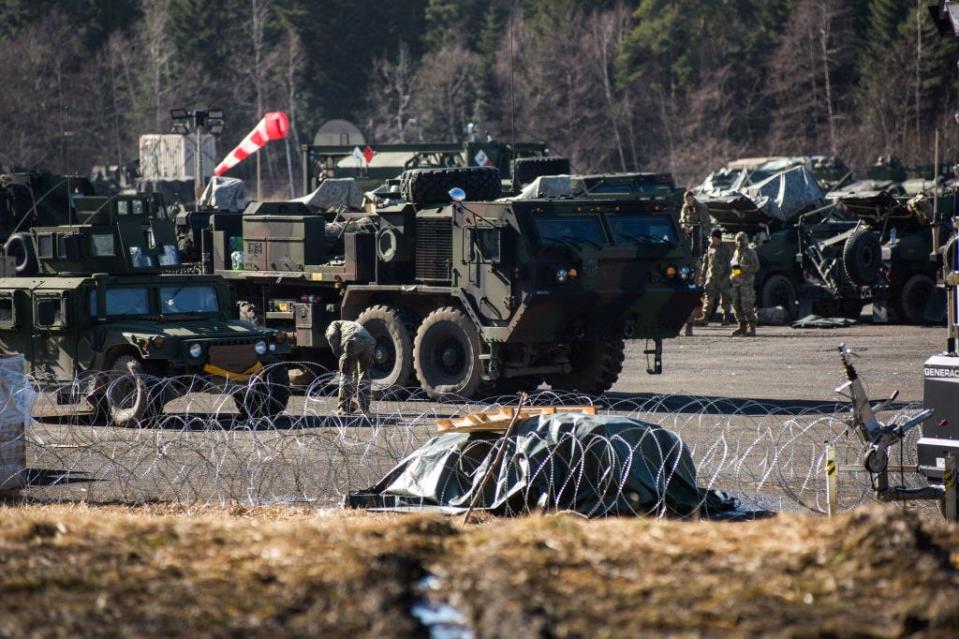Biden's debate disaster has thrown this week's NATO summit into chaos

- Oops!Something went wrong.Please try again later.
- Oops!Something went wrong.Please try again later.
- Oops!Something went wrong.Please try again later.
The NATO summit is being held in Washington, DC, this week.
It comes amid rising global conflict and turmoil.
But questions about President Joe Biden's political future could overshadow the meeting.
NATO leaders are gathering in Washington, DC, this week amid global conflict and rising tensions from Ukraine to the Taiwan Strait.
But it's the political future of the alliance's most powerful member, the US, that's expected to be a core focus of discussions.
Following his disastrous debate performance against Donald Trump on June 27, President Joe Biden's political future is in question just months before the November election.
NATO faces growing threats
European governments have been discussing how to "Trump-proof" NATO. One official told the Associated Press the mood ahead of the summit was "gloomy."

The 32-member alliance was formed during the Cold War as a bulwark against Soviet aggression. Under President Vladimir Putin, it's faced the most potent threat from Russia in decades.
The alliance is giving money and weapons to Ukraine to defend itself against the Russian invasion. Leaders believe that if Ukraine is defeated, Putin could move on to other parts of Europe in a matter of years.
Though Biden has been a staunch defender of NATO and has given Ukraine about $175 billion to help it fight Russia, Trump, who has increased his lead on Biden in many post-debate polls, has questioned both the US's commitment to NATO and to helping Ukraine defend its territory.
During Trump's four years in office, he accused NATO members of freeloading off the US, threatened to withdraw from the organization, promoted baseless conspiracy theories about Ukraine, and repeatedly praised Putin.
After decades of unbroken US backing for European security, Trump's presidency threw NATO into turmoil.
And on the 2024 campaign trail, he's offered, at best, ambivalent commitments to NATO and Ukraine.
Moves to 'Trump-proof' NATO
Trump has prompted some European leaders, including France's President Emmanuel Macron, to call for greater strategic autonomy for Europe to reduce its dependence on US wealth and military power.
Congress also moved to safeguard the US's NATO commitment, passing legislation requiring presidents to have congressional backing to withdraw from the alliance.
Trump, if reelected, could bypass this by cutting off NATO funding and military aid.
The Wall Street Journal reported that NATO members are expected to announce a range of new measures to "Trump-proof" the alliance this week, including taking the lead in coordinating the training and equipping of Ukrainian forces.
And though many NATO members have boosted their spending in the wake of the Russian invasion — about one-third of the member nations met their 2% defense-spending goal in 2023, The Washington Post reported — a lack of US support would leave a huge hole.
In the first few months of the year, there was a stark warning of what losing US support could mean for Ukraine.
As Republicans blocked a US aid bill, Ukraine's military came perilously close to collapse as it ran out of ammunition on parts of the front line. Ukraine's European allies were unable to make up the shortfall.
The prospect of a second Trump term means that NATO members are once again asking hard questions about the alliance's future.
Correction: July 8, 2024 — An earlier version of this article misstated the date of Biden and Trump's debate. It was on June 27, not June 28. It also misstated how many member states are in NATO. There are 32, not 23. It also misrepresented the number of NATO members that met the alliance's 2% GDP defense-spending goal. About one-third met this goal, not "nearly all of them."
Read the original article on Business Insider

